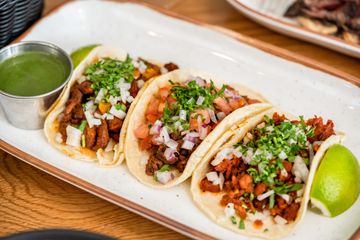End your meal with sweet churros served with sugar glaze sauce
Is Mexican Food Healthy? Unboxing the Nutritional Benefits of Typical Ingredients
The question of whether Mexican food is healthy welcomes an exploration of its typical ingredients. Beans and corn work as fundamental staples, abundant in protein and fiber. Avocados offer useful fats, while numerous herbs and seasonings include taste and health and wellness advantages - hand crafted margarita. Together, these components develop a tapestry of nourishment. However, the healthiness of Mexican cuisine typically relies on preparation techniques and section dimensions. What function do these elements play in establishing its general dietary worth?
The Power of Beans: Protein and Fiber-Rich Staples
Although frequently overlooked, beans work as a keystone of Mexican food, supplying a riches of nutritional benefits. Rich in protein, they are an outstanding plant-based choice for those seeking to meet their dietary healthy protein requires. This high healthy protein material supports muscular tissue repair and growth, making beans important for both vegetarians and meat-eaters alike. Additionally, beans are a remarkable source of nutritional fiber, which helps in digestion and promotes a sensation of fullness, potentially assisting with weight management.
The variety of beans used in Mexican recipes, such as black beans, pinto beans, and kidney beans, adds to a diverse flavor account and can improve meals nutritionally. In addition, beans are reduced in fat and contain essential minerals and vitamins, including iron, magnesium, and folate. With each other, these attributes make beans an important component, providing both sustenance and sustenance in standard Mexican price.

Corn: a Versatile Grain With Nutritional Conveniences
Corn sticks out as a versatile grain fundamental to Mexican cuisine, commemorated not just for its culinary applications yet also for its remarkable dietary account. As a main ingredient in recipes like tortillas, tamales, and pozole, corn offers vital nutrients that contribute to a balanced diet plan. Rich in carbs, it functions as a substantial energy resource, while also being reduced in fat, making it a positive option for different nutritional demands.
Moreover, corn is an excellent resource of dietary fiber, which helps in digestion and advertises satiation. It has significant amounts of vitamins such as B-complex vitamins, which are important for power metabolic rate. The presence of antioxidants, especially carotenoids, adds to overall health by reducing oxidative stress. Furthermore, corn is gluten-free, accommodating those with gluten level of sensitivities. On the whole, the nutritional advantages of corn emphasize its value in typical Mexican food and its role in a healthy and balanced diet plan.
Avocados: Healthy Fats and Nutrients in Every Bite
Avocados play a substantial duty in Mexican cuisine, enhancing meals with their velvety structure and abundant flavor. Past their culinary charm, avocados are commemorated for their excellent dietary profile. They are a rich resource of healthy and balanced monounsaturated fats, which can help lower bad cholesterol degrees and assistance heart wellness. In addition, avocados are loaded with vital nutrients, including potassium, vitamin E, and B vitamins, adding to total wellness.
The high fiber content in avocados aids digestion and promotes satiety, making them a useful addition to any type of meal. Their one-of-a-kind nutrient make-up can additionally sustain skin health and wellness and give anti-inflammatory benefits. Incorporating avocados into conventional Mexican recipes or appreciating them as a standalone treat can improve both flavor and nourishment, demonstrating why they are a precious staple in Mexican food. In general, avocados use a scrumptious method to delight in healthy and balanced fats and vital nutrients in every bite.

Seasonings and Natural Herbs: Flavorful Health Boosters
While enjoying the abundant tastes of Mexican food, one can not forget the crucial duty that spices and natural herbs play in see page improving both taste and wellness. Active ingredients such as cilantro, chili, and oregano peppers not only add to the dynamic flavor profile but also give substantial health and wellness benefits. For circumstances, cilantro is recognized for its purifying properties, helping to eliminate hefty metals from the body, while oregano is packed with anti-oxidants and possesses anti-inflammatory impacts.
Chili peppers, a staple in lots of Mexican recipes, include capsaicin, which has actually been linked to enhanced metabolic process and pain relief. Additionally, flavors like cumin and coriander support digestion and might aid in blood sugar guideline. Integrating these delicious wellness boosters right into meals not just enhances the cooking experience however likewise promotes overall well-being, making Mexican cuisine not just scrumptious, yet also nutritionally useful.
Conventional Food Preparation Methods: Enhancing Nutrition and Flavor
Traditional food preparation techniques in Mexican food play a crucial function in improving both nutrition and flavor, as they commonly prioritize classic methods and fresh ingredients. Methods such as nixtamalization, where corn is saturated and cooked in an alkaline remedy, not only enhance the nutrient profile of tortillas but likewise boost their digestibility - mexican food. Furthermore, making use of slow cooking techniques, like cooking or braising, allows flavors to fuse beautifully while retaining the stability of the components

Often Asked Inquiries
Are Mexican Food Portions Normally Larger Than Various Other Cuisines?
Mexican food sections are typically larger than those of lots of other cuisines. This particular reflects traditional eating techniques, stressing common sharing and hearty meals, which can cause a more significant offering dimension in general.
Just how Does the Preparation Approach Affect Healthfulness of Mexican Food?
Preparation approaches substantially affect the healthiness of Mexican food. Strategies such as barbecuing or steaming preserve nutrients, while frying can raise unhealthy fat web content. Options of components and cooking styles cheesecake factory near me ultimately figure out general nutritional value.
Can Mexican Food Be Tailored for Particular Dietary Limitations?
Mexican food can undoubtedly be tailored for specific nutritional constraints. Replacements, such as using corn tortillas for gluten-free diet plans or including more vegetables, allow individuals to take pleasure in typical flavors while suiting numerous nutritional needs.
What Prevail Misunderstandings Concerning Mexican Food and Health?
Typical misconceptions regarding Mexican food include the belief that it is inherently undesirable, excessively hot, and solely focused on fats. In truth, conventional recipes frequently feature nutritious active ingredients and can be customized to various nutritional needs.
Exist Healthier Choices at Mexican Restaurants?
Healthier options at Mexican restaurants commonly consist of barbequed meats, beans, and fresh vegetables. Selecting meals that emphasize entire components and preventing heavy sauces can lead to an extra nourishing eating experience, promoting overall health.
The range of beans made use of in Mexican recipes, such as black beans, pinto beans, and kidney beans, contributes to a diverse flavor account and can boost dishes nutritionally. Avocados play a significant role in Mexican food, enhancing dishes with their creamy appearance and rich flavor. Incorporating avocados into traditional Mexican dishes or appreciating them as a standalone treat can boost both taste and nutrition, showing why they are a precious staple in Mexican food. While enjoying the rich flavors of Mexican cuisine, one can not ignore the vital duty that spices and herbs play in improving both taste and health. Standard food preparation methods in Mexican food play a crucial duty in improving both nourishment and taste, as they typically prioritize classic techniques and fresh components.